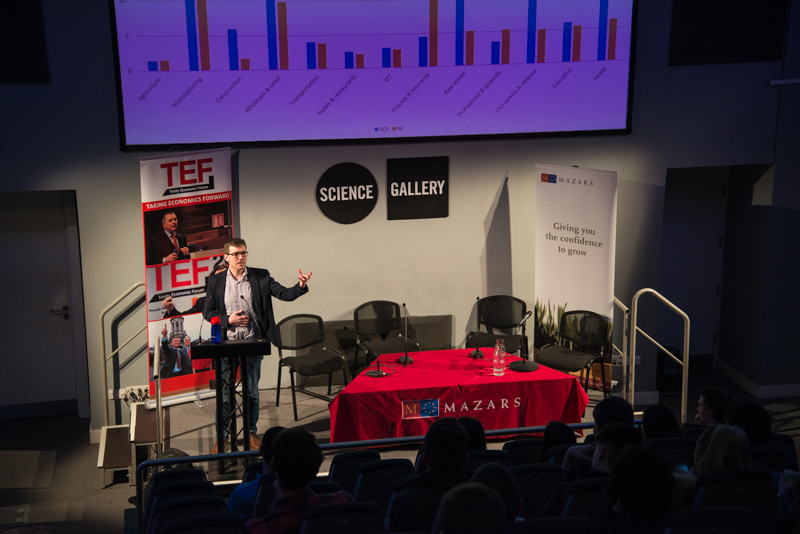
The second day of the 2017 Trinity Economic Forum (TEF) began with opening address from renowned Professor, white-collar crime lawyer and former bank regulator, William K Black. Prof Black currently holds the position of Associate Professor of Economics and Law at the University of Missouri-Kansas City in the Department of Economics and the School of Law. He was the Executive Director of the Institute for Fraud Prevention from 2005-2007 and litigation director for the Federal Home Loan Bank Board from 1984 to 1986.
From the beginning, Black captivated the audience by addressing one of the core areas in modern macroeconomics: criminology. Quoting Swift’s Guilliver’s Travels, “honesty has no defence against superior cunning”, he explained that fraudulent behaviour results in consequences not only felt by the consumers but also the honest players. Following the financial crisis of 2008 the failures of the regulatory system became apparent and the dissatisfaction of the mass population at government actions has catapulted ethics to the forefront of societal issues. However, despite the rise in awareness of fraudulent behaviour even fresh water economists have failed to account for these implications in any economic model.
Black then continued describe the current Gresham Dynamic ingrained in the economy today. Corroborating the sentiments of economist George Akerlof, dishonest dealings tend to drive honest dealings out of the market. The cost of dishonesty, therefore, lies not only in the amount by which the purchaser is cheated, the cost also must include the loss incurred from driving legitimate business out of existence. This current state of almost perfect macro dystopian in modern economics has resulted in fraud being taken more seriously in the field.
Continuing to convey the severity of the issue, Black described the $600 trillion cartel in the Libor market, how all retail profits from banks had previously stemmed from the payments scandal and the fact fraud was seen to be an opportunistic business model. The market does not have a conscience, there are two assumptions in economics regarding human behaviour – that people act rationally and optimise their self-interest leading to the macroeconomic dystopian described by economist Kartik Athreya.
Black then challenged Adam Smith’s “paradox of dystopia” that described the alchemy of free-markets transforming dystopian motives into utopian results. This paradigm indicates that business owners will see the long-term benefits of serving the interests of consumers. Black challenged the invisible hand argument by saying markets are inherently and hopelessly incomplete and it is time economists account for this fact in their models. Black argues that even freshwater economists who attempt to consider individual behaviour as a prime component still fail to fully represent the pathological complexity of markets and the complete market paradigm.
Referring again to the work of Athreya, Black explained how within these freshwater economic models, the implicit assumptions in the underlying “rigorous” micro-foundations are still fundamentally flawed. In Kartik B Athreya’s “Don’t Deify Decentralization”, there lies the silent assumption of an “ADM God”, a central planner that will oversee all actions with perfect information and ensure fraudulent behaviour isn’t an option. This Arrow–Debreu model is the key underpinning all theo-classical economics, the indefensible and arguably irrational assumption ensures the models don’t spiral out of control. How can we defend a model entailing foundations that rest on a “God-like auctioneer” free from the restrictions of self-interest who will preserve laissez faire of free market economies?
The in-depth analysis provided by Black clearly expressed the key message that the theories we view as intrinsic to modern macroeconomics are founded on a primordial but undoubtedly flawed assumption. Contrasting to the views of McCloskey’s utopian idealism of mutual agreements, Black has adopted a more cynical, yet realistic approach to the role of regulation and the dystopian environment born from economically rational yet fraudulent behaviour.






